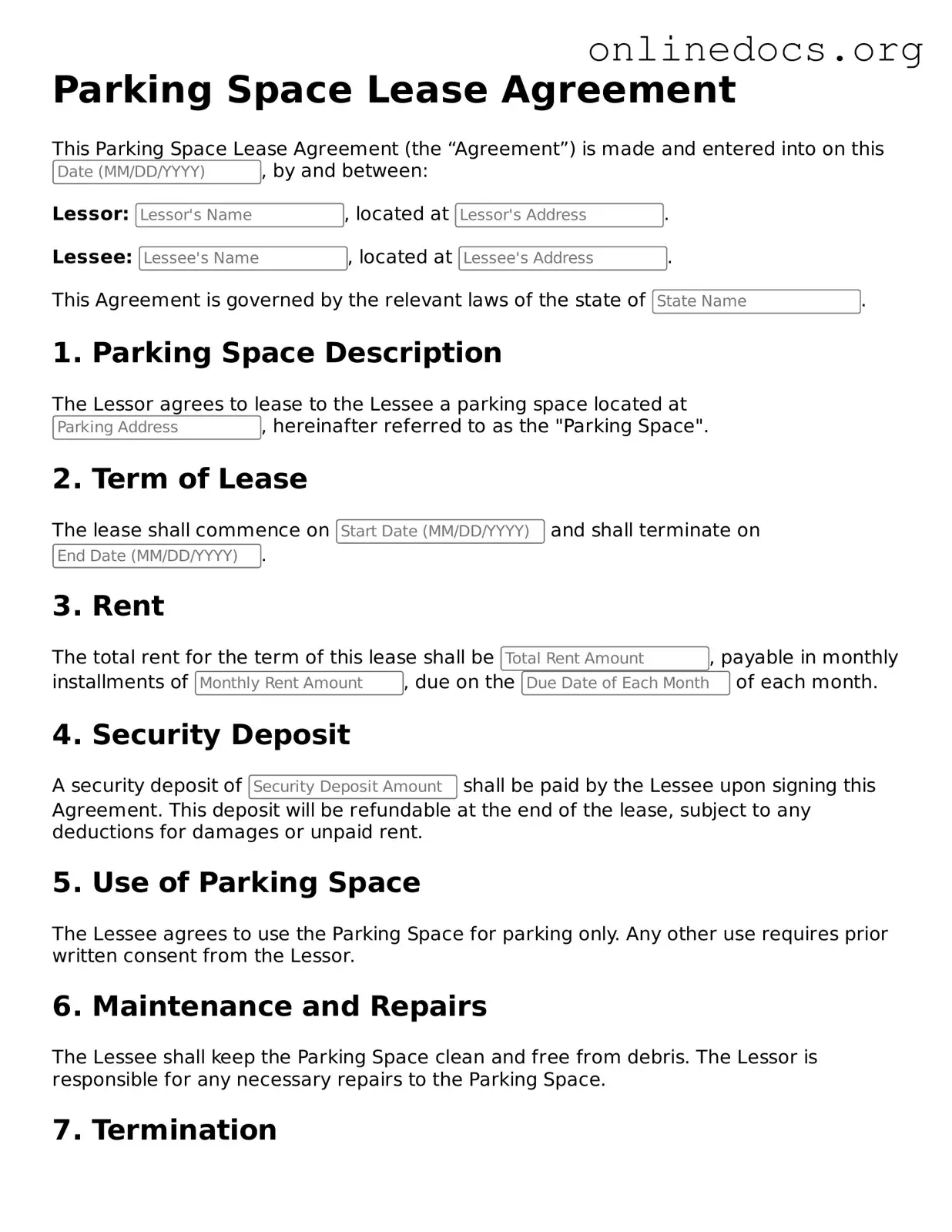The Parking Space Lease Agreement is similar to a Residential Lease Agreement. Both documents outline the terms under which one party can occupy a space owned by another. They specify the duration of the lease, payment terms, and responsibilities of both parties. Just as a residential lease protects the rights of tenants and landlords, a parking space lease ensures that both the renter and the owner understand their obligations regarding the use of the parking area.
Another document akin to the Parking Space Lease Agreement is the Commercial Lease Agreement. This type of lease applies to business properties, including parking spaces used for commercial purposes. Both agreements detail the rental terms, including fees, duration, and maintenance responsibilities. They also often include clauses about liability and insurance, ensuring that both parties are protected in case of accidents or damages.
The Storage Unit Rental Agreement shares similarities with the Parking Space Lease Agreement as well. Both documents involve renting a designated space for a specific purpose—either for parking or for storing personal belongings. They outline the rental period, payment details, and rules regarding access and use of the space. Each agreement aims to clarify the rights and responsibilities of the renter and the owner, minimizing potential disputes.
In California, understanding various agreements, such as the Boat Slip Rental Agreement or the Garage Lease Agreement, is crucial for both landlords and tenants. These arrangements are similar to a parking space lease, as they outline the rental terms, including duration and responsibilities. For those seeking templates and guidance, resources like legalformspdf.com can provide valuable information on these essential documents.
A Vehicle Lease Agreement is another related document. While it pertains to leasing a vehicle rather than a space, both agreements involve the rental of property. They detail terms such as payment, duration, and conditions for use. Both documents protect the interests of the lessor and lessee, ensuring that expectations are clear and legally enforceable.
The Equipment Rental Agreement is also comparable. It governs the rental of specific equipment, much like a parking space lease governs the use of a parking area. Each agreement specifies the rental period, payment terms, and responsibilities for maintenance and care. Both documents aim to protect the rights of the owner while providing clear guidelines for the renter.
A Sublease Agreement can be likened to the Parking Space Lease Agreement as well. It allows a tenant to lease out their rented space to another party. This agreement includes terms similar to the original lease, such as duration and payment. Both documents ensure that the rights of the original lessor are upheld, and they clarify the responsibilities of all parties involved.
The License Agreement is another document that shares similarities. This agreement allows one party to use another's property under specific conditions. While a parking space lease is more formal and binding, a license may be less stringent. Both documents outline the terms of use, duration, and any fees involved, ensuring that the property owner retains control over their space.
The Terms of Service Agreement, often used in online platforms, has some parallels with the Parking Space Lease Agreement. Both documents set out the rules and conditions under which a service or space is provided. They clarify the rights and responsibilities of each party, ensuring that there is a mutual understanding of what is expected. Both agreements aim to prevent misunderstandings and provide a framework for resolving disputes.
Finally, the Homeowners Association (HOA) Agreement can be compared to the Parking Space Lease Agreement. While the HOA agreement governs the rules for living in a community, it often includes provisions for shared parking spaces. Both documents outline the rights and responsibilities of residents regarding the use of shared spaces, including any fees or regulations that must be followed. They serve to maintain order and ensure that all residents have fair access to communal resources.
